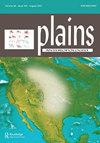Reanalysis of equid faunal remains from the Blacks Fork River site (48SW8319): A unique look at a protohistoric horse in Wyoming
Q2 Social Sciences
引用次数: 1
Abstract
The reintroduction of Equus caballus (horse) into North America during European-American contact altered Native American life on the Plains. The horse influenced a variety of cultural practices, including transportation and warfare. Despite the impact of the horse on Native Plains cultures, there is a paucity of horse remains in the archaeological record in Wyoming and the Great Plains in general. In this article, the results of a reanalysis of a set of horse remains from the Protohistoric Period are described. The horse remains from the Blacks Fork River site in Wyoming provides a unique opportunity to examine a preserved interaction between humans and a horse from the early contact period. Reanalysis includes a re-examining of the faunal elements to re-establish the horse's age and evidence of butchering and radiocarbon dating to confirm the temporal span of the remains.对Blacks Fork River遗址马类遗骸的重新分析(48SW8319):怀俄明州一匹原始历史马的独特观察
在欧美接触期间,马重新引入北美,改变了美洲原住民在平原上的生活。马影响了各种文化习俗,包括运输和战争。尽管马对原住民平原文化产生了影响,但在怀俄明州和大平原的考古记录中,马的遗骸却很少。本文介绍了一组史前时期马遗骸的再分析结果。怀俄明州Blacks Fork河遗址的马遗骸为研究早期接触时期人类和马之间保存下来的相互作用提供了一个独特的机会。重新分析包括重新检查动物区系元素,以重新确定马的年龄,以及屠宰和放射性碳年代测定的证据,以确认遗骸的时间跨度。
本文章由计算机程序翻译,如有差异,请以英文原文为准。
求助全文
约1分钟内获得全文
求助全文

 求助内容:
求助内容: 应助结果提醒方式:
应助结果提醒方式:


